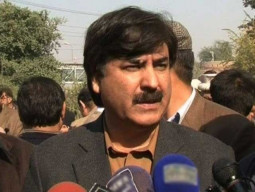
Experts suggested implementing the Women’s Property Act 2019, to make sure rural women are not left behind.
This was suggested during an event jointly hosted on Tuesday by the Food and Agriculture Organization (FAO) of the United Nations, UN Women Pakistan and International Labour Organization (ILO) in connection with the International Women’s Day.
Two panel discussions were organised following the theme for this year’s Women’s Day: “I am Generation Equality: Realizing Women’s Rights”. Representatives from development sectors, non-governmental organisations (NGO), and rural women discussed existing policies and frameworks to safeguard the rights of rural working women.
While moderating a panel, FAO Country Representative Mina Dowlatchahi pointed to the inequality in how women are paid. Of the 65 million women in the rural areas of the country, around 62% women work in the fields while only 19% of the women are in paid employment and a whopping 60% work as unpaid workers on family farms and enterprises.
The value of the unpaid work is around 2.6% of the national gross domestic product (GDP). Of the entrepreneurs — touted as the sector which has the greatest potential to save the national economy —only one per cent of all women are entrepreneurs in Pakistan; 20% of rural women are classified as own-account workers – including 14% in agriculture and 6%in non- agriculture work.
“Women are not paid equally to that of their male counterparts,” Dowlatchahi said, adding that this situation prevails even though women have made steady progress in gaining representation.
“Women are still not present in equal numbers in business or politics, and globally women's education, health and the violence against them is worse than that of men,” she said, noting that this is reflected in how Pakistan ranks 152nd in the Human Development Index.
Younas Khalid, a senior gender advisor for UN Women Pakistan, said, “We cannot claim to be on the road to advancing gender equality if we do not promote rural women’s participation in decision-making and involve them in the design, development, implementation, monitoring and evaluation of all relevant policies and strategies with focus on climate change.”
“Fewer rural women make decisions about paid work, marriage or family planning,” Khalid said, adding, “Rural women face limited access to financial services, health and basic services.”
“We must strengthen rural women’s access to health and other basic services, including education.”
He further suggested introducing technology for easing domestic burden through labour-saving devices and improving agricultural work through tools and equipment to support rural women.
Published in The Express Tribune, March 11th, 2020.

1732745394-0/Diddy-(4)1732745394-0-165x106.webp)















COMMENTS
Comments are moderated and generally will be posted if they are on-topic and not abusive.
For more information, please see our Comments FAQ